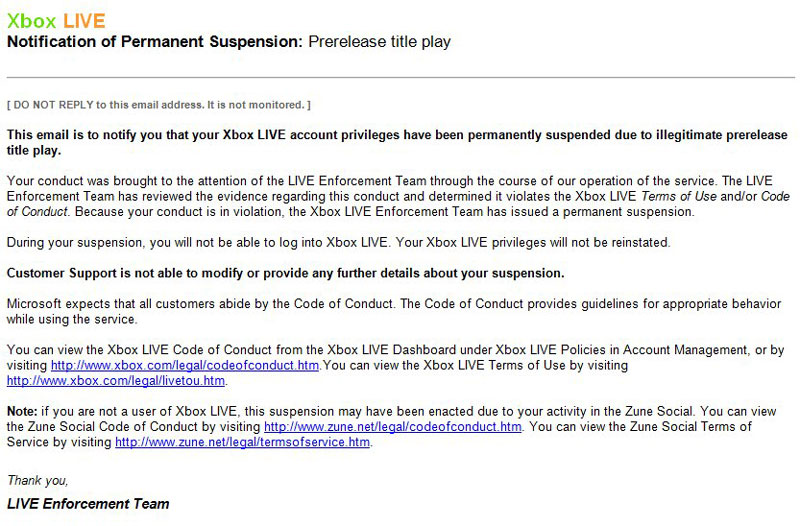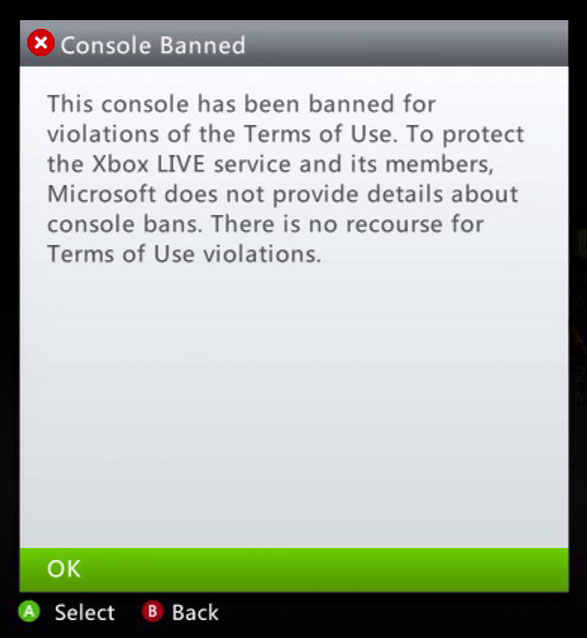We don't often think of "online" as being an integral part of the console experience, but that's only because the integration has slowly crept in over the years. On both Sega's Dreamcast and the original Xbox, going online was a deliberate choice. Sony's PlayStation 3 is still like this to some extent, with going online being something you opt to do rather than a default action. On Microsoft's Xbox 360, being online is the default rather than the exception.
The current Xbox 360 dashboard is designed around the idea that the user is always online. Everything from game box art to game recommendations and other ads are dependent on an Internet connection. Once you've gotten used to it, having an Xbox 360 that is not connected to Xbox Live feels wrong. It's almost as if the console is naked without it. Populating the dashboard with content is only half of it.
Your Xbox Live account also serves as a personal identifier online and the key to all of your digital content. All those Xbox Live games you've bought? Xbox 360 Games on Demand? It's the key to accessing them. It also ties into any content purchased on Xbox Music, Xbox Video, Zune, Windows Phone and the new Windows 8 OS.
That very integration is Microsoft's strongest deterrent against Terms of Service violations, such as online fraud and piracy. Although the Xbox 360 can be "modded" rather easily in order to play pirated games, most rational users won't risk doing it because getting caught means ending up with a banned console, a banned Xbox Live account or both.
What exactly happens when a system is banned, though? Until yesterday, it's a question I've always dealt with in the abstract. Just before lunch on Friday, I got to experience banning firsthand.
As soon as it happened, I immediately guessed the cause. I've been playing a review copy of Halo 4 this week in order to write the upcoming review (Editor's Note: Look for our review on November 1st). For pre-release titles like this, Microsoft has members of the press submit our gamertags in advance. These are then put on a whitelist, which lets the enforcement team know that we're supposed to have the game. In reality, PR and enforcement are two different departments, and my tag happened to fall through the cracks.

When the ban message appeared in my e-mail, I did three things: 1) Sent a tweet to @XboxSupport as any customer would do, 2) Sent an e-mail to my PR contact and 3) Looked around to see what the banning meant in terms of access.
My first impression was the speed with which @XboxSupport replied. About five minutes elapsed from my initial tweet to the first response. By any account, that's mighty impressive. The Twitter support team pointed me to Microsoft's support page on account banning and told me to follow up with the enforcement team via the official support forums. Microsoft has a forum for account bans as well as one for console bans. Looking through the forums shows that the enforcement team is active and follows up on questions raised, though the setup does have some issues from a customer service standpoint.
The biggest problem is one of access. When your Xbox Live account is banned, it impacts all Microsoft services, including Xbox.com and the forums. This means that it is impossible for a banned user to even post in the appropriate forums. Instead, you must create a new Xbox Live account and then log into the forums. For all Microsoft does right with Xbox support, this is a very poor design choice.

If you're honest about it, the majority of bans are deserved. But the chances of a teen or pre-teen being honest with a parent about hacking a system or profile or cheating online are pretty slim. Instead, a parent (who probably pays the Xbox Live subscription fee every year) is just going to hear, "I have no idea why I was randomly banned." When the parent heads off for help, he or she is going to hit an immediate roadblock. For the tech savvy, it's a minor speed bump, but for those who aren't, it can feel like a brick wall.
What Microsoft should be doing here is allowing the banned accounts to access those two specific support forums. Blocking everything else is fine, but let the blocked accounts have direct access to support. This will make it less frustrating for the non-tech savvy, as well as allow for specific account communication if necessary. After all, support has no way of knowing who is behind a secondary account. For a parent, having easy access to support is going to make the whole process less adversarial, especially when they have to hear that their little angel wasn't being entirely honest.
With Xbox.com locked out, I played with my console for a few minutes. The system informed me I was banned in no uncertain terms. Connecting to Xbox Live was a no-go, but I could still log in locally and access my games. The ban didn't make the Xbox 360 unusable, but it certainly made the hardware a lot less attractive.

Shortly thereafter, I heard from my PR contact. We chatted for a bit, and he let me know that the enforcement team was getting things sorted. What really impressed me was his mention that the Twitter support team had already alerted the enforcement team, and they were looking into it by the time he contacted them. This happened even though I never gave my account specifics to the Twitter team (I don't play online under the WorthPlaying gamertag; I use a long-standing personal account when online). It makes you wonder how much information is tracked behind the scenes to have it all operate seamlessly.
All in all, the entire process took a little over an hour to go from ban back to active status. I still can't access the official Xbox forums, which likely means those are running on a different system. A quick e-mail on Monday should get it sorted.
Looking back, the experience made it clear how much effort Microsoft puts into ensuring that Xbox Live stays fun and fair for all members. The consequences for banning are both swift and harsh, but they almost have to be. When it comes down to it, the biggest advantage to Xbox Live, and the reason millions pay for a Gold subscription, is the quality of the community. The enforcement team is the primary reason cheaters, hackers and scammers are kept to a minimum. They're invisible to the vast majority of us that play by the rules, but at the end of the day, they deserve our thanks for a job well done.









